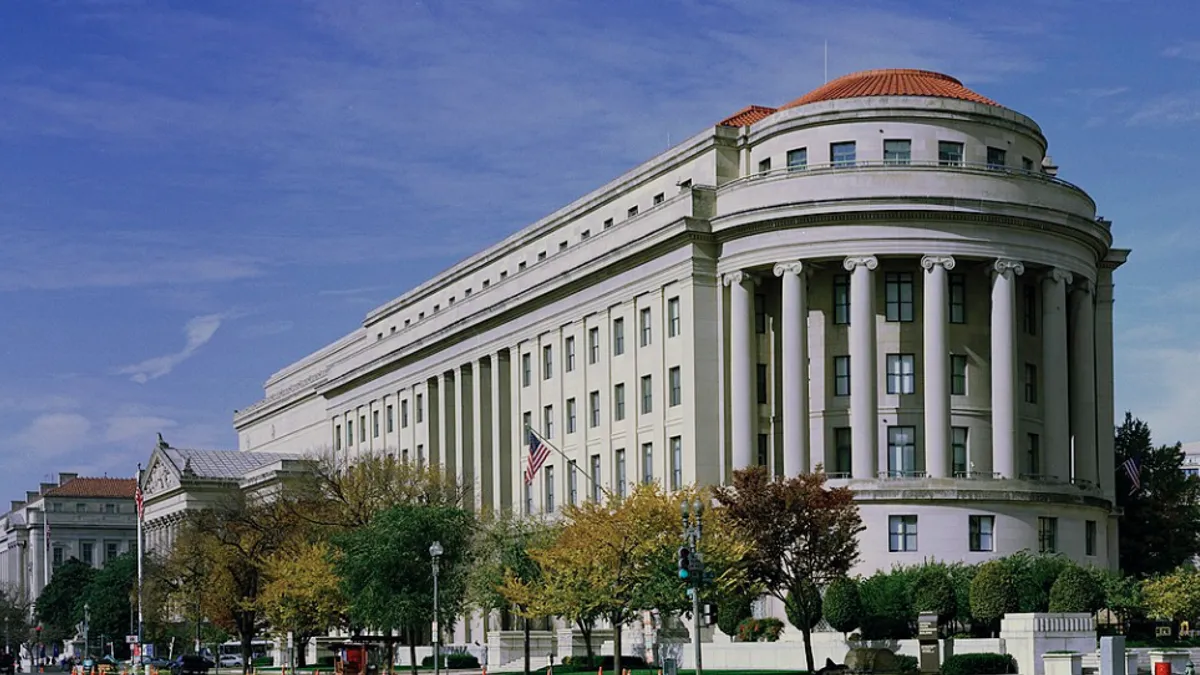Proposed business combinations that fall below the $101 million Hart-Scott-Rodino (HSR) threshold will be subject to compulsory antitrust review by the Federal Trade Commission under a controversial amended resolution the agency passed last month.
The resolution is one of three that were approved. The other two make reviews mandatory whenever the agency learns companies are coordinating their efforts in some way and when it has concerns car rental companies are engaging in unfair practices.
Making the reviews compulsory “simply removes an unnecessary and time-consuming barrier to staff’s pursuit of an investigation,” FTC Chair Lina Khan and two other commissioners who approved the resolutions, Alvaro Bedoya and Rebecca Kelly Slaughter, said in a statement.
Under-the-radar mergers
Eliminating the HSR threshold for automatic review is intended to make it harder for companies to avoid scrutiny when they try to buy up small competitors or otherwise propose a merger to amplify their market control.
“Some of the largest firms in our economy have made hundreds of acquisitions that were not reported to the FTC or DOJ,” FTC commissioners said in their majority statement.
The concern is that many companies, particularly in the technology sector, are manipulating debt and executive compensation terms, among other things, to get deals under the threshold.
An analysis the FTC commissioned a few years ago found that a number of merger deals that avoided automatic review over a 10-year study period used terms that kept them under the threshold.
In 36% of the cases, for example, the acquiring companies assumed some of the other company’s debt or other liabilities, removing those amounts from the threshold calculation.
“When added to the purchase price of the target, such debts and liabilities would have tipped the purchase amount of three transactions above the HSR size of transaction threshold,” the agency said.
Similarly, almost 80% of the mergers used deferred or contingent compensation to founders and key employees. Of those, nine would have exceeded the HSR size of transaction threshold had the compensation not been structured the way it had been.
Among the companies that side-stepped review were some of the biggest in the tech field: Alphabet, Amazon, Apple, Facebook and Microsoft.
The commissioners said the use of “avoidance devices ... actively subverts” their work.
Two of the FTC’s commissioners voted against the compulsory-review resolution, saying the move puts too much control in the hands of staff without oversight by the agency’s leadership.
The FTC already has “longstanding and well-functioning (and perfectly expeditious) Commission procedures,” commissioners Noah Joshua Phillips and Christine Wilson said in their dissent.
Coordination review
The anti-collusion resolution makes reviews automatic when the agency believes companies are coordinating in some fashion that could ultimately lead to anti-competitive harm.
“This conduct involves competitors working together against consumer or worker interests rather than competing against one another,” the agency said. “There have been reports of companies appearing to use their public statements as invitations to their competitors to collude in industries as diverse as mobile phone networks, soft drinks, and meat packing.”
In their dissenting statement, Phillips and Wilson said compulsory reviews risk putting companies in the crosshairs for actions that courts have routinely said don’t amount to collusion. Instead, the agency should continue to do what it’s doing now, which is limit reviews to cases in which it has reason to believe collusion, rather than just lawful coordination, is going on.
“There may be circumstances in which investigations of tacit coordination are appropriate, but those investigations should be authorized on a case-by-case examination of the facts rather than under an omnibus resolution,” they said.
In their majority statement, the commissioners said the stepped-up authority will help staff obtain documents and testimony quicker, because “this is the kind of competition harm that warrants fast and thorough investigation.”











